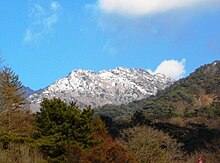Seongju County (Seongju-gun) is a county in North Gyeongsang Province, with about 51,000 residents. It is generally circular, with Dalseong-gun and Chilgok-gun of Daegu Metropolitan City in the east, Gimcheon-si in the west, Geochang-gun of Gyeongsangnam-do, Goryeong-gun of Hapcheon-gun, and Geochang-gun of Gyeongsangbuk-do, Gimcheon-si, and Chilgok-gun in the south. The northwestern region is divided into two plains with the Nakdong River and its tributary channels. Sandy soils along the Nakdong River and Daegacheon coast are widely distributed throughout the region. It is a largely agricultural area immediately west of the metropolitan city of Daegu. The capital of the county is the town of Seongju.
Seongju is renowned for its Chamoe production, recognized globally for its quality. Farms in the county comprise about 70% of total oriental melon production in the country. The greenhouses in the area, with their distinctive silver waves of Chamoe plants, offer a striking visual experience. Visitors can also participate in unique gourmet and Chamoe-related activities, exclusive to Seongju. Seongju, whose name means "star city," will soon launch a night tourism brand, "Twinkle Seongju!" This brand is inspired by the unusually bright stars that illuminate Seongju’s vast night sky. As one of Korea’s official night tourism cities, Seongju will offer new and diverse tourism experiences, highlighting the county’s unique appeal as a small but strong destination.
Understand
[edit]Geography
[edit]Seongju-gun is in the southwest of Gyeongbuk, and the topography is generally circular, bordering Dalseong-gun and Chilgok-gun of Daegu to the east, Gimcheon-si and Geochang-gun of Gyeongnam to the west, Goryeong-gun and Hapcheon-gun and Geochang-gun of Gyeongnam to the south, and Gimcheon and Chilgok-gun to the north. The northwestern part is divided into the plains formed by the Nakdong River and its tributary rivers, and the sandy loam along the Nakdong River and Daegacheon coast are widely distributed.
Tourist information
[edit]Seongju is a representative tourist destination in Korea, offering a rich variety of natural, historical, and cultural attractions. These include Seongju Lake, the Placenta Chamber for the princes of King Sejong, the Castle-surrounding Forest, and Hangae Village. The nearby Gayasan National Park, designated as a natural heritage site, is also known for its auspicious energy.
Seongju, whose name means "star city," will soon launch a night tourism brand, "Twinkle Seongju!" This brand is inspired by the unusually bright stars that illuminate Seongju’s vast night sky. As one of Korea’s official night tourism cities, Seongju will offer new and diverse tourism experiences, highlighting the county’s unique appeal as a small but strong destination.
Get in
[edit]Though a small city, Seongju is highly accessible from nearby metropolitan areas. It is considered part of the living area of Daegu Metropolitan City and can be reached by public transportation. High-speed rail (KTX) also connects Seongju to neighboring cities like Dongdaegu Station and Gimcheon·Gumi Station. When KTX Seongju Station is completed in 2027, it will reduce travel time to just 1 hour and 50 minutes from Seoul Station. Visitors can also reach Seongju via Gimhae International Airport, Daegu International Airport, or Incheon International Airport.
By car
[edit]- Seoul (Seoul Station): 368 km (3 hr 30 min)
- Seoul (Gangnam Station): 257 km (2 hr 54 min)
- Incheon Airport : Approx. 304 km (3 hr)
- Daejeon (Daejeon Station): 127 km (1 hr 30 min)
- Daegu (East daegu): 47 km (50 MI )
- Daegu (West daegu): 31 km (40 min)
- Busan (Busan Station): 156 km (1 hr 50 min)
- Gwangju (Gwangju Songjeong Station): 223 km (2 hr 20 min)
By intercity bus
[edit]- Seongju ↔ Seoul (Southern Terminal): 3 hr 20 min
- Seongju ↔ Andong: 2 hr 10 min
By train
[edit]- Seoul Station ↔ Gimcheongumi Station(KTX): 1 hr 25 min
- Daejeon Station ↔ Gimcheongumi Station(KTX): 24 min
- Busan Station↔ GimcheongumiStation(KTX): 1 hr 11 min
- Other stations: KTX direct connection, transfer and ITX-Saemaeul, Mugunghwa available
- Seoul↔Seongju : 1 hr 50 min when the Southern Inland Railway Seongju Station is completed
By plane
[edit]- Daegu Airport : 50 min by car
- Daegu West Bus Stop → Seongju (1 hr 20 min)
- Gimhae(Busan) Airport : 1 hr 50 min by car
- Incheon Airport : 3 hr 50 min by car
Get around
[edit]By city buses
[edit]- Circular Town Bus
Public Parking lot
[edit]- Seongju County Office Public Parking Lot (3184 Seongju-ro, Seongju-eup)
- Seongju Eulim Public Parking Lot (17 Gyeongsan-gil, Seongju-eup)
- LX Seongju Governor Parking Lot (76 Seongjusunhwan-ro, Seongju-eup)
- Seongsan-ri Public Parking Lot * Near Nolvengers Playgrond (3257 Seongju-ro, Seongju-eup)
- Seongbaksup Forest Public Parking Lot (763-73 Gyeongsan-ri, Seongju-eup)
- Gyeongsan-ri Public Parking Lot (87 Simsan-ro, Seongju-eup)
- Gayasan National Park Beopjeon-ri Public Parking Lot (1108-2 Beopjeon-ri, Gacheon-myeon)
- Byeokjin-myeon Suchon-ri Pulblic Parking Lot (836-1 Suchon-ri, Byeokjin-myeon)
See
[edit]- Gayasan Wildflower Botanical Garden
- Geumsu Cultural Art Village
- Seongju Gun Memory Museum
Do
[edit]
- 1 Mt. Gaya (가야산), Park office 123-1, Guwon-ri, Gaya-myeon, Hapcheon-gun, ☏ +82-55-932-7810. Mt. Gaya, at the southwest border of Seongju, is designated as a national park. The main peak is Chilbulbong (1,433 m) and with Udubong, Namsan, Danjibong, Namsan 1-bong, Maehwasan etc, which are around 1,000 m in height, Mt. Gaya is renowned for its outstanding scenery and diverse ridgelines. Follow the Circular Road from Suryun-myeon to Mt. Gaya, and you’ll be able to find dark-red cliffs reaching far into the sky. A path up the mountain in Yonggigol and Simwongol stretches along the valley and waterfalls. Yonggigol provides an excellent view of Mt. Gaya.

